Understanding home renovation costs is crucial for successful budgeting and maximizing return on investment (ROI). This guide emphasizes the importance of considering scope of work, materials, labor, and unforeseen costs. It recommends tailoring online cost estimators to location, project complexity, and desired outcomes. Budgeting starts with gathering current market rates, breaking down tasks, and setting aside contingencies (10-15% of total budget). Decoding expenses involves differentiating fixed from variable costs and using guides for accurate estimation. Affordability isn't about minimizing costs but maximizing value; strategic planning, utilizing pricing guides, and cost-saving tactics ensure successful home upgrades with high ROI.
Planning renovation costs is an art that blends strategic financial management with vision. Understanding the intricate web of home renovation costs—from materials and labor to design and permits—is crucial for maximizing return on investment (ROI). This comprehensive guide delves into essential factors influencing renovation budgets, provides a step-by-step planning process, breaks down remodeling expenses, and offers tips for affordable yet valuable home upgrades. Leveraging these insights will empower you to navigate the complexities of renovation pricing guides and ensure your project delivers long-term value.
Understanding Home Renovation Costs: Essential Factors to Consider
Understanding Home Renovation Costs: Essential Factors to Consider
Renovation budget planning is a crucial step in ensuring long-term value and return on investment (ROI) for your home upgrade expenses. Before diving into the remodeling process, it’s essential to familiarize yourself with the various components that contribute to the cost of home improvements. A renovation pricing guide can provide a general overview, but specific factors will heavily influence the final price tag. These include the scope of work, materials chosen, labor rates, and any unforeseen expenses. For instance, a simple kitchen remodel might range from affordable home renovation options with a budget-friendly focus on new cabinets and countertops to more extensive upgrades involving plumbing, electrical work, and flooring.
When planning your renovation budget, consider both the tangible and intangible aspects of your project. Remodeling cost breakdown should include not just the visible changes but also any necessary structural modifications, permits, and professional fees. Additionally, think about the future resale value and energy efficiency benefits that strategic home improvements can bring. Utilizing online renovation cost estimators can provide a starting point for budgeting, but it’s essential to tailor these estimates to your specific location, project complexity, and desired outcomes.
Creating a Realistic Renovation Budget: Step-by-Step Guide
Creating a realistic renovation budget is a crucial step in ensuring your home improvement project delivers long-term value and a solid return on investment (ROI). Start by gathering all necessary information, including current market rates for labor and materials. This can be done through online research, consulting with local contractors, or reviewing past projects.
Next, break down the renovation into smaller tasks or categories: structural changes, plumbing, electrical work, finishing touches, and so on. Assign a realistic cost to each based on your region and project scope. Don’t forget to factor in contingencies—unforeseen expenses can arise, so setting aside 10-15% of your total budget is wise. Online renovation cost estimators and pricing guides can provide valuable insights but remember, these are just averages; your actual costs may vary.
Decoding Remodeling Expenses: Breaking Down the Cost Breakdown
Decoding Remodeling Expenses: Unraveling the Cost Breakdown
Planning for a successful home renovation involves understanding that remodeling expenses can vary widely based on factors like project scope, location, and design choices. Before diving into any upgrade, it’s crucial to create a detailed renovation budget planning guide. Start by identifying specific areas of improvement—from kitchen remodels to bathroom overhauls—as this will significantly influence the cost of home improvements. Researching renovation pricing guides can offer valuable insights into average spending for different projects.
A robust renovation budget should account for both fixed and variable costs. Fixed expenses include labor, permits, and material fees, while variable costs are more fluid, covering everything from appliances to fixtures. Utilizing online remodeling cost breakdown tools or consulting professionals can help estimate these expenses accurately. Remember, an affordable home renovation isn’t just about minimizing costs; it’s about maximizing value, ensuring your project aligns with your financial goals, and delivering a substantial return on investment (ROI).
Maximizing ROI: Tips for Affordable and Valuable Home Upgrades
Maximizing ROI through smart and strategic home upgrades is achievable when homeowners plan their renovation budget effectively. One key tip is to prioritize projects that offer a high return on investment (ROI). This means focusing on renovations that not only increase your home’s value but also align with your daily needs and preferences. For instance, remodeling the kitchen or bathroom often yields significant returns since these spaces are central to family life.
When planning your renovation costs, create a detailed breakdown of expected expenses using a renovation pricing guide. This will help you stay within budget and make informed decisions about which upgrades to prioritize. Consider using affordable home renovation tactics such as replacing outdated fixtures with energy-efficient models or freshening up existing surfaces with new paint or countertops instead of full replacements. Utilizing cost estimators can also provide valuable insights into typical remodeling expenses, ensuring your project stays on track financially.
Planning for home renovation costs is a strategic process that requires careful consideration and a well-informed approach. By understanding the essential factors, creating a realistic budget using step-by-step guides, and decoding the various expense components, you can maximize your return on investment (ROI). Utilizing tips for affordable home renovations and referring to reliable renovation pricing guides will ensure you make sound financial decisions that enhance your property’s value over time. Remember, effective budgeting and knowledge of remodeling expenses are key to achieving both long-term value and a positive ROI from your home upgrades.
